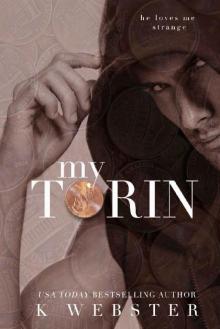 My Torin
My Torin The Lost Planet Series: Boxed Set: Books 1-5
The Lost Planet Series: Boxed Set: Books 1-5 Prince Charming
Prince Charming Koyn
Koyn No Tears with Him
No Tears with Him He Made Me Stay
He Made Me Stay Stroke of Midnight
Stroke of Midnight Hood River Rat (Hood River Hoodlums Book 1)
Hood River Rat (Hood River Hoodlums Book 1) Hood River Zero (Hood River Hoodlums Book 4)
Hood River Zero (Hood River Hoodlums Book 4) Bond Deeper Than Blood
Bond Deeper Than Blood Little Hoodlum (Hood River Hoodlums Book 2)
Little Hoodlum (Hood River Hoodlums Book 2) The Vanished Specialist
The Vanished Specialist Broken (Breaking the Rules Series Book 1)
Broken (Breaking the Rules Series Book 1)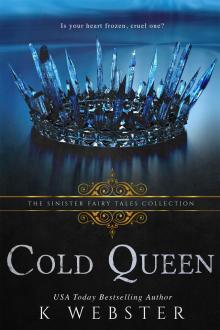 Cold Queen
Cold Queen Red Hot Winter
Red Hot Winter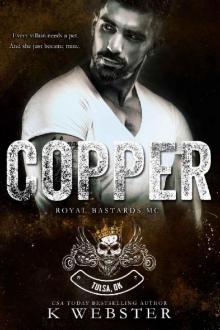 Copper (RBMC: Tulsa, OK Book 2)
Copper (RBMC: Tulsa, OK Book 2) Choke Me
Choke Me Laska
Laska Wrong
Wrong Koyn (Royal Bastards MC)
Koyn (Royal Bastards MC) The Glass Slipper: A Cinderella Novel
The Glass Slipper: A Cinderella Novel Crybaby
Crybaby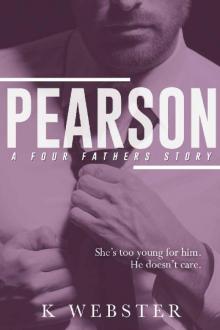 Pearson
Pearson Rock Heart
Rock Heart B-Sides and Rarities: A Collection of Unfinished Madness
B-Sides and Rarities: A Collection of Unfinished Madness Sex, Vows & Babies: Surviving Harley (Kindle Worlds Novella)
Sex, Vows & Babies: Surviving Harley (Kindle Worlds Novella) The Road Back to Us
The Road Back to Us Camden_Four Sons
Camden_Four Sons Rock Bottom
Rock Bottom The Free
The Free Preach
Preach Skyscraper Cinderella
Skyscraper Cinderella The Wild
The Wild Dirty Ugly Toy
Dirty Ugly Toy Apartment 2B
Apartment 2B Mistake
Mistake Running Free
Running Free This Isn't You, Baby (War & Peace Book 4)
This Isn't You, Baby (War & Peace Book 4) Easton
Easton Cold Cole Heart
Cold Cole Heart B-Sides and Rarities
B-Sides and Rarities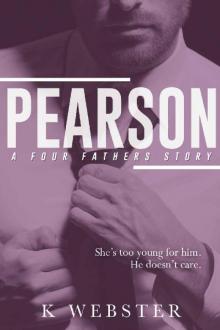 Pearson (Four Fathers Book 3)
Pearson (Four Fathers Book 3)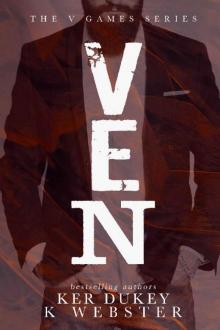 VEN
VEN Moth to a Flame
Moth to a Flame Rock Country
Rock Country Whispers and the Roars
Whispers and the Roars Ex-Rated Attraction
Ex-Rated Attraction El Malo
El Malo Renner's Rules
Renner's Rules This Is Love, Baby (War & Peace #2)
This Is Love, Baby (War & Peace #2) Becoming Mrs. Benedict
Becoming Mrs. Benedict Give Me Yesterday
Give Me Yesterday Sweet Jayne
Sweet Jayne Alpha & Omega
Alpha & Omega The Day She Cried
The Day She Cried Zeke's Eden: The Beginning (Zeke and Eden Book 1)
Zeke's Eden: The Beginning (Zeke and Eden Book 1) Becoming Countess Dumont
Becoming Countess Dumont This Is War, Baby
This Is War, Baby This Is Me, Baby (War & Peace #5)
This Is Me, Baby (War & Peace #5) Notice
Notice This Isn't Fair, Baby (War & Peace Book #6)
This Isn't Fair, Baby (War & Peace Book #6) Omega & Love (Alpha & Omega Book 2)
Omega & Love (Alpha & Omega Book 2) Hale
Hale Scarred
Scarred Coach Long
Coach Long Lawn Boys
Lawn Boys This is the End, Baby (War & Peace Book 7)
This is the End, Baby (War & Peace Book 7) Schooled by a Senior
Schooled by a Senior Love and Law
Love and Law Malfeasance
Malfeasance Bad Bad Bad
Bad Bad Bad Crushed (Breaking the Rules Series Book 5)
Crushed (Breaking the Rules Series Book 5)